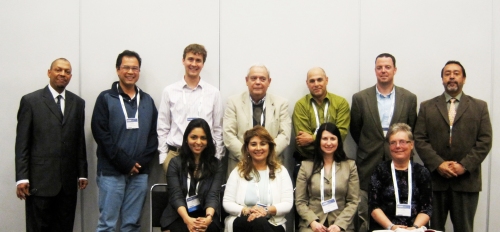By Vanessa Santos, Advancing Green Building Intern, Second Nature
When the economy takes a turn for the worse, all organizations, especially those within the education sector, suffer. However, under-resourced and minority-serving colleges and universities are stepping up to prove that ambition, useful information and timely opportunities can overcome the financial concerns that are often associated with pursuing a sustainability agenda on campus.
Second Nature’s Kresge Fellowship Program – as part of its Advancing Green Building Initiative –awarded 40 fellowships total in 2009 and 2010 to senior-level executives at under-resourced colleges and universities. With these fellowships, the 40 executives attended a green building conference where they were able to network with each other and professionals in their field as well as to learn more about sustainability and green building on college and university campuses.
In the last two years, these fellows and their institutions have already taken significant steps to bring sustainability to their campuses, despite being especially strapped for resources. A large reason for this action is the learning and networking experience these fellows gained through attending a national green building conference and through their participation in the Fellowship Program.
In his descriptive report update, 2009 fellow Tim Johnston from Northeast Texas Community College (NTCC) discusses the development of the college’s new Agriculture Center. Thanks to the information he gained at the 2009 Greenbuild Conference on the American Recovery and Reinvestments Act, NTCC applied for an energy grant and was awarded $750,000 in energy stimulus money. The grant is allowing them to install an 85 kilowatt photovoltaic system with a 2.4 kilowatt wind generator, which would qualify the building for LEED platinum certification!
In addition to not having knowledge of or access to certain funding opportunities, under-resourced and minority-serving institutions may be unable to afford the green building learning curve that can arise from both a lack of in-house technical expertise and a limited choice of building consultants (who charge high premiums for green building). Virginia Bender, a 2009 fellow from Saint Peter’s College, a Historically Black College, discusses this exact problem which her institution faced when trying to build a LEED building prior to her attending the conference.
“My campus colleagues and I had been misinformed by consultants about the cost differential for LEED certified buildings,” Ms. Bender said in her update report. “The conference offered insights into the costly learning curve when working with personnel with limited green building experience. This advice has been critical in selecting partners for our project.”
Debunking the myth that building sustainably is much more costly has allowed Saint Peter’s College to pursue their sustainability goals despite their own financial concerns.
Although 2010 Kresge Fellows have only just returned from their green building conference of choice, they’ve eagerly dived into the task of bringing sustainability to their campuses. Deborah McArthur from White Earth Tribal Community College (WETCC) says that, upon her return from the conference, her institution started with small steps (the “low hanging fruit”) to bring sustainability to the campus, and has started educating students about sustainability. Additionally, thanks to 2010 fellow Mary Anne Shope, Pulaski Technical College has just established a “green” committee that will help implement future sustainability measures such as improving energy efficiency and incorporating sustainability into the curriculum. A recycling committee on campus has also started researching a comprehensive recycling program.
“We did not have sustainability in our strategic plan at PTC, but after meeting with the committee yesterday, we all agreed that it is a necessary requirement,” Ms. Shope said. “I am not sure this would have happened without the intervention of Second Nature or the Kresge Foundation and the information I was able to bring back to the college.”


Comments
gdyersecondnature
December 15, 2010 at 10:36 am
Thanks for this great post, Vanessa - these success stories are really inspiring!